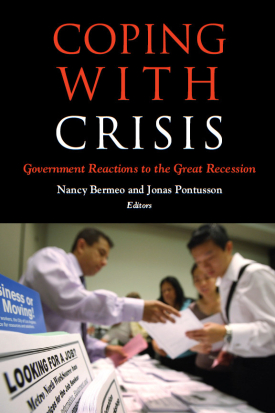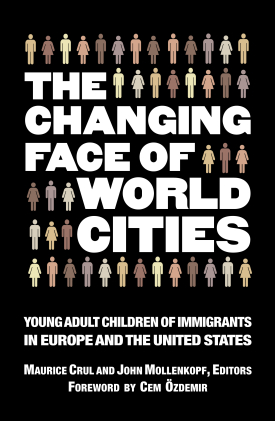Political equality is one of the basic tenants of democracy. However, although it may never be possible to achieve complete political equality, rising economic inequality in the U.S. threatens to create a political system in which the voices of the wealthy drown out those of the poor and middle class. Martin Gilens explored this phenomenon in his 2012 RSF/Princeton book Affluence and Influence: Economic Inequality and Political Power in America. Gilens found that policy outcomes are more strongly related to the preferences of the wealthy than the poor or middle class.
The American population has become increasingly diverse in the last few decades, and current trends indicate that it will become even more diverse in the future. While these trends are easy to measure, far less is known about their actual impact on American society and institutions. As diversity increases, the concept of an “American identity” may be shifting, and many may also have competing identities. Recent immigrants, for example, may identify with their country of origin, while others may strongly identify with their racial or ethnic group.

Coping with Crisis
About This Book
Winner of a RIPE Read Award from the Review of International Political Economy
The financial crisis that erupted on Wall Street in 2008 quickly cascaded throughout much of the advanced industrial world. Facing the specter of another Great Depression, policymakers across the globe responded in sharply different ways to avert an economic collapse. Why did the response to the crisis—and its impact on individual countries—vary so greatly among interdependent economies? How did political factors like public opinion and domestic interest groups shape policymaking in this moment of economic distress? Coping with Crisis offers a rigorous analysis of the choices societies made as a devastating global economic crisis unfolded.
With an ambitiously broad range of inquiry, Coping with Crisis examines the interaction between international and domestic politics to shed new light on the inner workings of democratic politics. The volume opens with an engaging overview of the global crisis and the role played by international bodies like the G-20 and the WTO. In his survey of international initiatives in response to the recession, Eric Helleiner emphasizes the limits of multilateral crisis management, finding that domestic pressures were more important in reorienting fiscal policy. He also argues that unilateral decisions by national governments to hold large dollar reserves played the key role in preventing a dollar crisis, which would have considerably worsened the downturn. David R. Cameron discusses the fiscal responses of the European Union and its member states. He suggests that a profound coordination problem involving fiscal and economic policy impeded the European Union's ability to respond in a timely and effective manner. The volume also features several case studies and country comparisons. Nolan McCarty assesses the performance of the American political system during the crisis. He argues that the downturn did little to dampen elite polarization in the United States; divisions within the Democratic Party—as well as the influence of the financial sector—narrowed the range of policy options available to fight the crisis. Ben W. Ansell examines how fluctuations in housing prices in thirty developed countries affected the policy preferences of both citizens and political parties. His evidence shows that as housing prices increased, homeowners expressed preferences for both lower taxes and a smaller safety net. As more citizens supplement their day-to-day income with assets like stocks and housing, Ansell's research reveals a potentially significant trend in the formation of public opinion.
Five years on, the prospects for a prolonged slump in economic activity remain high, and the policy choices going forward are contentious. But the policy changes made between 2007 and 2010 will likely constrain any new initiatives in the future. Coping with Crisis offers unmatched analysis of the decisions made in the developed world during this critical period. It is an essential read for scholars of comparative politics and anyone interested in a comprehensive account of the new international politics of austerity.
NANCY BERMEO is the Nuffield Professor of comparative politics at Oxford University, Oxford, U.K.
JONAS PONTUSSON is professor of comparative politics at the University of Geneva, Switzerland.
CONTRIBUTORS: Ben W. Ansell, Klaus Armingeon, Lucio Baccaro, Lucy Barnes, David R. Cameron, Eric Helleiner, Torben Iversen, Johannes Lindvall, Nolan McCarty, David Rueda, Waltraud Schelkle, David Soskice, Yves Tiberghien, Anne Wren.
RSF Journal
View Book Series
Sign Up For Our Mailing List
Apply For Funding

The American Non-Dilemma
About This Book
Winner of the 2013 C. Wright Mills Award from the Society for the Study of Social Problems
Winner of the 2014 Book Award from the Inequality, Poverty, and Mobility Section of the American Sociological Association
Runner Up, 2014 Academy of Management's George R. Terry Book Award
The Civil Rights movement of the 1960s seemed to mark a historical turning point in advancing the American dream of equal opportunity for all citizens, regardless of race. Yet 50 years on, racial inequality remains a troubling fact of life in American society and its causes are highly contested. In The American Non-Dilemma, sociologist Nancy DiTomaso convincingly argues that America's enduring racial divide is sustained more by whites' preferential treatment of members of their own social networks than by overt racial discrimination. Drawing on research from sociology, political science, history, and psychology, as well as her own interviews with a cross-section of non-Hispanic whites, DiTomaso provides a comprehensive examination of the persistence of racial inequality in the post-Civil Rights era and how it plays out in today's economic and political context.
Taking Gunnar Myrdal's classic work on America's racial divide, The American Dilemma, as her departure point, DiTomaso focuses on "the white side of the race line." To do so, she interviewed a sample of working, middle, and upper-class whites about their life histories, political views, and general outlook on racial inequality in America. While the vast majority of whites profess strong support for civil rights and equal opportunity regardless of race, they continue to pursue their own group-based advantage, especially in the labor market where whites tend to favor other whites in securing jobs protected from market competition. This "opportunity hoarding" leads to substantially improved life outcomes for whites due to their greater access to social resources from family, schools, churches, and other institutions with which they are engaged.
DiTomaso also examines how whites understand the persistence of racial inequality in a society where whites are, on average, the advantaged racial group. Most whites see themselves as part of the solution rather than part of the problem with regard to racial inequality. Yet they continue to harbor strong reservations about public policies—such as affirmative action—intended to ameliorate racial inequality. In effect, they accept the principles of civil rights but not the implementation of policies that would bring about greater racial equality. DiTomaso shows that the political engagement of different groups of whites is affected by their views of how civil rights policies impact their ability to provide advantages to family and friends. This tension between civil and labor rights is evident in Republicans' use of anti-civil rights platforms to attract white voters, and in the efforts of Democrats to bridge race and class issues, or civil and labor rights broadly defined. As a result, DiTomaso finds that whites are, at best, uncertain allies in the fight for racial equality.
Weaving together research on both race and class, along with the life experiences of DiTomaso's interview subjects, The American Non-Dilemma provides a compelling exploration of how racial inequality is reproduced in today's society, how people come to terms with the issue in their day-to-day experiences, and what these trends may signify in the contemporary political landscape.
NANCY DITOMASO is professor of organization management at Rutgers University.
RSF Journal
View Book Series
Sign Up For Our Mailing List
Apply For Funding

The Changing Face of World Cities
About This Book
A seismic population shift is taking place as many formerly racially homogeneous cities in the West attract a diverse influx of newcomers seeking economic and social advancement. In The Changing Face of World Cities, a distinguished group of immigration experts presents the first systematic, data-based comparison of the lives of young adult children of immigrants growing up in seventeen big cities of Western Europe and the United States. Drawing on a comprehensive set of surveys, this important book brings together new evidence about the international immigrant experience and provides far-reaching lessons for devising more effective public policies.
The Changing Face of World Cities pairs European and American researchers to explore how youths of immigrant origin negotiate educational systems, labor markets, gender, neighborhoods, citizenship, and identity on both sides of the Atlantic. Maurice Crul and his co-authors compare the educational trajectories of second-generation Mexicans in Los Angeles with second-generation Turks in Western European cities. In the United States, uneven school quality in disadvantaged immigrant neighborhoods and the high cost of college are the main barriers to educational advancement, while in some European countries, rigid early selection sorts many students off the college track and into dead-end jobs. Liza Reisel, Laurence Lessard-Phillips, and Phil Kasinitz find that while more young members of the second generation are employed in the United States than in Europe, they are also likely to hold low-paying jobs that barely life them out of poverty. In Europe, where immigrant youth suffer from higher unemployment, the embattled European welfare system still yields them a higher standard of living than many of their American counterparts. Turning to issues of identity and belonging, Jens Schneider, Leo Chávez, Louis DeSipio, and Mary Waters find that it is far easier for the children of Dominican or Mexican immigrants to identify as American, in part because the United States takes hyphenated identities for granted. In Europe, religious bias against Islam makes it hard for young people of Turkish origin to identify strongly as German, French, or Swedish. Editors Maurice Crul and John Mollenkopf conclude that despite the barriers these youngsters encounter on both continents, they are making real progress relative to their parents and are beginning to close the gap with the native-born.
The Changing Face of World Cities goes well beyong existing immigration literature focused on the U.S. experience to show that national policies on each side of the Atlantic can be enriched by lessons from the other. The Changing Face of World Cities will be vital reading for anyone interested in the young people who will shape the future of our increasingly interconnected global economy.
MAURICE CRUL is professor of sociology at Erasmus University Rotterdam.
JOHN MOLLENKOPF is Distinguished Professor of Political Science and Sociology, and director, Center for Urban Research, at The Graduate Center, City University of New York.
CONTRIBUTORS: Richard Alba, Susan K. Brown, Leo Chavez, Louis DeSipio, Rosita Fibbi, Nancy Foner, Barbara Herzog-Punzenberger, Philip Kasinitz, Elif Keskiner, Jennifer Lee, Laurence Lessard-Phillips, Leo Lucassen, Liza Reisel, Jeffrey G. Reitz, Jens Schneider, Philipp Schnell, Patrick Simon, Thomas Soehl, Van C. Tran, Constanza Vera-Larrucea, Mary Waters, Min Zhou.
RSF Journal
View Book Series
Sign Up For Our Mailing List
Apply For Funding
The Great Recession's economic impact on minorities and immigrants has been especially devastating. Between 2005 and 2009, Hispanic households lost 66 percent of their wealth and black households lost 53 percent, while white households lost only 16 percent. By 2010, when the overall unemployment rate was around 10 percent, it was 16 percent for blacks and 13 percent for Latinos. This economic turmoil also came in the midst of a major increase in the minority and immigrant populations. Between 2000 and 2008, a full 83 percent of all population growth was among non-whites.
Ever since the Great Depression and the advent of the New Deal, most Americans have accepted the idea that the government should play a role in managing the economy and addressing major social challenges. However, despite general agreement that the government should play some role in managing the economy, attitudes about the nature and size of that role vary widely. These attitudes increasingly divide along party lines and deepen the polarization among the electorate and politicians alike.
Pagination
- Previous page
- Page 28
- Next page
